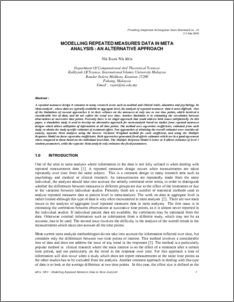Nik Idris, Nik Ruzni
(2008)
Modelling repeated measures data in meta analysis: an alternative approach.
In: Simposium Kebangsaan Sains Matematik Ke-16, 3-5 June 2008, Kota Bharu, Kelantan.
![[img]](http://irep.iium.edu.my/style/images/fileicons/application_pdf.png)  Preview |
|
PDF ( MODELLING REPEATED MEASURES DATA IN META ANALYSIS : AN ALTERNATIVE APPROACH )
- Accepted Version
Download (334kB)
| Preview
|
Abstract
A repeated measures design is common in many research areas such as medical and clinical trials, education and psychology. In Meta analysis , where data are typically available at aggregate level, the analysis of repeated measures data is more difficult. One of the limitations of current approaches is in their reliance on the measures at only one or two time points, which involved a considerable loss of data, and do not reflect the trend over time. Another limitation is in estimating the correlation between observations at successive time points. Presently there is no single approach that could address both issues satisfactorily. In this paper, a simulation study is used to develop an alternative approach for meta-analysis based on studies from repeated measures designs which allows utilization of information at all time points. The method uses regression coefficients, estimated from each study, to obtain the study specific estimates of treatment effect. Two approaches of obtaining the overall estimates were considered, namely, separate Meta analyses using the Inverse Variance Weighted method for each coefficient, and using the Multiple Response Model on these regression coefficients. Both approaches generated fixed effects estimates which are in a good agreement when compared to those based on the individual level data. The Multiple Response Model is better as it allows estimates of level 3 random parameters, while the separate Meta analysis only estimates the fixed parameters.
Actions (login required)
 |
View Item |


 Download Statistics
Download Statistics Download Statistics
Download Statistics